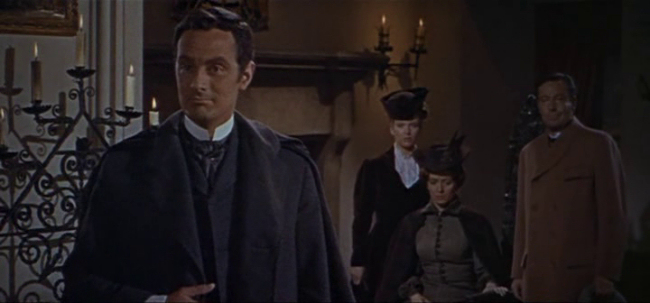
It's amazing how a thousand small steps can lead you to exactly where you didn't want to go. That's why 1966's Dracula: Prince of Darkness works so well, and a lot better than 1958's Dracula though the earlier film was based more closely on Bram Stoker's novel and both films were directed by Terence Fisher and released by Hammer. Prince of Darkness is a much more organic story, building from character development and an atmosphere of apprehension.
Both films also had screenplays by Jimmy Sangster but not having to force Stoker's story to accommodate the sensibilities of the contemporary filmmaking culture seems to have freed up Sangster's creative faculties in Prince of Darkness. Indeed, it's a much leaner tale following four English tourists in the German town of Karlsbad who, despite warnings, end up at one of Dracula's castles after one thing leads to another with subtle inevitability.

I'm reminded of one of my favourite quotes from Edgar Allan Poe, from his story "The Black Cat":
Of this spirit philosophy takes no account. Yet I am not more sure that my soul lives, than I am that perverseness is one of the primitive impulses of the human heart—one of the indivisible primary faculties, or sentiments, which give direction to the character of Man. Who has not, a hundred times, found himself committing a vile or a silly action, for no other reason than because he knows he should not? Have we not a perpetual inclination, in the teeth of our best judgment, to violate that which is Law, merely because we understand it to be such? This spirit of perverseness, I say, came to my final overthrow. It was this unfathomable longing of the soul to vex itself—to offer violence to its own nature—to do wrong for the wrong's sake only—that urged me to continue and finally to consummate the injury I had inflicted upon the unoffending brute.

It's not so much that the four travellers in Prince of Darkness do anything that is outright wrong but they do manage to talk themselves out of the sense of danger implied by their coachman's dire warnings, the warning from the friar at a local tavern who urges them not to go to Karlsbad despite the fact that he scoffs at the superstitions of the vampire-fearing villagers. Played by Andrew Keir, this clergyman, named Sandor, is the film's version of Van Helsing and is actually more effective than Cushing's take on the character in the 1958 film for seeming more complex, more flawed. Sandor speaks too roughly sometimes and seems to regret it, he overlooks things more easily, coming off as slightly more brutish and clumsy.

Barbara Shelley plays one of the tourists, Helen, whose instincts seem sharper than the other three's, and it's she who has to be convinced every step of the way by the rashest of the group, Charles (Francis Matthews), that it's silly not to go through Karlsbad, that it's ridiculous to stay the night in a shack when there's a perfectly nice castle nearby, or anyway let's take the conveniently appearing carriage to the nearest town.
A spoiler follows
In light of this, it's interesting that Shelley is turned into a vampire by Dracula. She's always set in opposition to the other characters, first as the spirit of wise restraint and then as a figure of diabolical menace. The image of her being held down by a group of men who drive the phallic stake through her heart is hard not to see as reflecting men feeling threatened by independent women.
End spoilers

That Dracula himself is a somewhat vague figure in the story contributes to the feeling of focus on female sexuality. This was Christopher Lee's first return to the role after the 1958 film and he has no lines whatsoever. Wikipedia quotes Lee as saying, "I didn’t speak in that picture. The reason was very simple. I read the script and saw the dialogue! I said to Hammer, if you think I’m going to say any of these lines, you’re very much mistaken." Jimmy Sangster, though, said, "Vampires don't chat. So I didn't write him any dialogue. Chris Lee has claimed that he refused to speak the lines he was given ... So you can take your pick as to why Christopher Lee didn't have any dialogue in the picture. Or you can take my word for it. I didn't write any." I would generally be inclined to believe Lee and yet a silent Dracula makes sense in the context of the movie's themes.

There are two items in the final act of the film that seem like they may have inspired Francis Ford Coppola in his adaptation of Dracula--Thorley Walters plays a lunatic named Ludwig who's kept locked up in Sandor's monastery where we watch him catching and eating flies. He bears a great deal of resemblance to Tom Waits' Renfield, a character from the book who was absent in the 1958 film, unusual considering he appears in nearly all other film adaptations. Prince of Darkness also features one of the most unambiguously sexual depictions of vampirism, Dracula cutting his breast open for a woman to drink from, a moment that was replicated almost exactly in Coppola's film.

The context is very different, though--Dracula is a more fully realised character in the Coppola film while in Prince of Darkness he is a mute, ambiguous figure of dirty sex, more of a manifestation of men's insecurities than of man.

One of the problems with Hammer vampire films is that the vampires seem like they have more weaknesses than strengths, this film relying on a particularly pathetic vampire weakness to running water. Not holy water, just water that's moving. Along with the vampires being completely overcome by anything even slightly resembling a cross, it does diminish the feeling of dread they inspire somewhat, but mostly Dracula: Prince of Darkness is a nice sequence of menace.

No comments:
Post a Comment